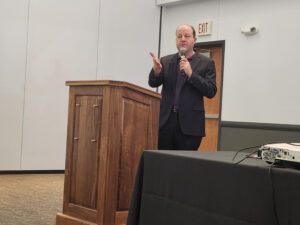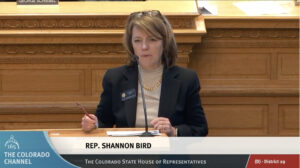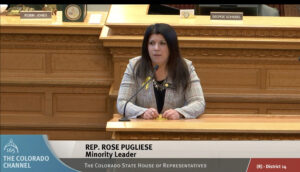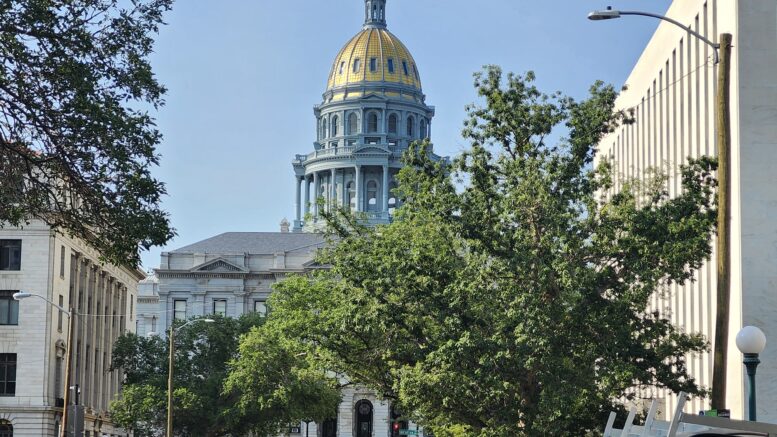Colorado legislators will be returning to the state Capitol on Aug. 21 for a special session to patch a massive hole in the state budget, consider raising fees on insurance policies and deal with unfinished business regarding the state’s artificial-intelligence regulations.
Gov. Jared Polis issued his long-anticipated call for the session Wednesday, putting parameters around it that the Legislature may consider bills to close the budget gap, boost insurance subsidies or fix or delay the scheduled Feb. 1 implementation of new AI rules. Sessions must last for at least three days — the minimum amount of time required to pass a bill through both chambers — but may go longer, particularly if the subjects are as complex as the ones that the Democratic governor is asking to be taken up.
Federal tax cuts spawn special session
Polis’ call comes one week after economists estimated that the state budget would fall $955 million short of being able to meet obligations this year because of newly enacted federal tax cuts in House Resolution 1 — a number since revised down to $783 million. Those tax cuts, most mirrored in state policy, allow for quicker depreciation of equipment, increased deductions on loan interest and on research-and-development costs, credits on overtime and tipped wages and extension of a tax break for LLCs, among other things.
“We have a responsibility to deliver a balanced budget to Coloradans, so after careful consideration, I am calling the General Assembly to reconvene to find the best possible solution to the havoc H.R.1 has wreaked on Colorado’s budget,” Polis said in a news release. “This isn’t about rhetoric; this is about hard numbers and balancing our budget. We are committed to working alongside the General Assembly to address the unexpected and immediate revenue shortage caused by the passage of H.R.1.”

Gov. Jared Polis speaks at a regional talent summit on March 18 in Arvada.
Legislators have three options for closing the shortfall, and they are likely to use some combination of them. They can dip into the state’s $2.33 billion reserve fund, cut spending or eliminate tax breaks in order to raise revenue. Polis also used his executive order calling the special session to announce a state-government hiring freeze from Aug. 27 through Dec. 31, which will help with the budget-balancing.
Tax breaks on the cutting block
While some Democrats have been discussing a wide range of tax-break rollbacks they’d like to make, such as revival of a failed effort from the 2025 session to end a tax exemption on software sales, Polis’ order lets them consider only specific options. Those include:
- Adjustments to the home-and regional-office tax breaks given to national insurers who employ at least 2.5% of their workforce in Colorado. Sponsors of a bill that would have raised the tax-break benchmark to 7% and reduced the usage of the breaks significantly had to strike that provision this past session because of a lack of support, but the order signals that discussion is back on the table.
- Decoupling from federal tax policy several provisions in state law, which would allow companies to continue to get federal tax breaks but also be required to add to their income for state-tax purposes the income they were allowed to deduct on the federal level. Those include extended decoupling of a 20% deduction that LLCs and sole proprietorships receive, as well as decoupling of the foreign-derived intangible income deduction in which companies get a break on the export of products related to intellectual property.
- Adjustments and reductions to sales-tax vendor fees, in which Colorado retailers get to keep a portion of the sales taxes that they calculate and remit to the state. Legislators last reduced those fees in 2021, banning the largest-grossing companies from receiving them.
- Expansion of the foreign countries that the state considers to be tax havens, which in turn would require companies and taxpayers to report on state tax forms the income that is derived from C corporations incorporated in those countries.
- Allowance for the state to sell tax credits, including insurance premium tax credits, to certain taxpayers.
Funding cuts coming in special session too
While Polis’ executive order does not include estimates of the financial impact of any of these moves, it is extremely unlikely that they alone could close the existing budget gap. Therefore, legislators also would have to reduce spending in certain areas of their choosing — the special-session call does not specify where — and/or dip into the reserves.
No sooner had Polis issued his call than interest groups had begun lobbying in public statements to save their areas from budget cuts. The Colorado Educational Association asked state leaders to protect K-12 funding, and the Colorado Hospital Association called on officials to protect hospital and Medicaid funding.

Colorado state Rep. Shannon Bird speaks on the House floor during the 2023 legislative session.
“We are committed to finding responsible solutions, but this billion-dollar hole in our state budget will require difficult decisions,” said Rep. Shannon Bird, a Westminster Democrat and vice chairwoman of the Joint Budget Committee.
A hike to health-insurance fees?
In one instance, Polis appeared to call on legislators in his executive order to raise a fee — specifically, the 2.1% fee on all health-insurance policies sold by a for-profit insurer (or 1.15% on non-profit insurers) that funds the Health Insurance Affordability Enterprise. That fee generates $119 million annually for the reinsurance program that keeps down individual health-insurance premiums in high-cost areas, the OmniSalud program providing insurance to undocumented immigrants and the subsidies the state offers through its health-insurance exchange.
House Bill 1297, a bill to increase the HIAE fee, died in the 2025 session amid concerns over rising cost of living. But a reduction to federal subsidies that was done later in H.R. 1 led insurers to propose average 28% premium increases on Colorado’s individual market, and a separate decision by Congress not to extend enhanced premium tax credits means many individuals will pay more than twice as much for insurance in 2026 as they do now.
Colorado Insurance Commissioner Michael Conway, speaking during a stakeholder meeting on rate reviews Friday, said the increase to HIAE fees is needed more now than ever to avoid cuts to all three of the programs it funds. Seeking fee increases from all policyholders would allow that state to distribute the money toward people who need it the most and stop some of what he’s estimated will be 110,000 people from disenrolling from private insurance plans.
“I know in part (HB 1297) didn’t get through just because our state legislators hadn’t heard from folks on the need for it,” Conway said. “I believe that is how change will happen, that legislators will hear from you all now.”

Colorado Insurance Commissioner Michael Conway speaks during a virtual stakeholders meeting on Friday.
Artificial-intelligence regulations
The wild card for the session, however, is likely to be the debate around AI regulation, which has been going on since the Legislature passed the country’s most comprehensive rules in 2024 but delayed their implementation until Feb. 1, 2026. Polis put together a task force to recommend changes in the law that would protect consumers from discriminatory decisions made by AI without pushing the growing sector out of the state, but a hoped-for solution died in May amidst bickering between members.
Polis’ order Wednesday outlined the need for solutions, saying the current law would impose high compliance costs upon both businesses and governments, and it lays out two potential paths for legislators. One would involve solutions that reduce costs and negative economic impacts without wiping out consumer protections; the other would just allow additional time for implementation, as a group of legislators tried unsuccessfully to do in a late-session bill.
“Given the widespread agreement that changes need to be made and the short timeline between the (Jan. 14) start of (regular) session and implementation date, I am asking the General Assembly to work toward solutions,” Polis wrote in his order.
This may be the stickiest issue of the special session, as it likely will take more than three days to advance a bill that makes substantial changes to the 2024 law. Not only that, but primary author of that law, Senate Majority Leader Robert Rodriguez, controls the Senate calendar and could make it very difficult for any overhaul that he does not agree with to get through his chamber.
Partisan divide on special session
As Democratic legislative leaders expressed a willingness to make budget changes because of a “cruel” federal bill that cuts state tax revenues and likely state services, Republican leaders criticized Polis’ call for the special session. House Minority Whip Carlos Barron of Fort Lupton said Polis should cut waste rather than find ways to get new revenue from taxpayers, and Assistant House Minority Leader Ty Winter of Trinidad decried the overlap of the session with the State Fair, which is important to the rural community.

Colorado House Minority Leader Rose Pugliese speaks on the House floor during a past session.
“We do not need a special session,” House Minority Leader Pugliese, R-Colorado Springs, said. “We need leadership that knows how to budget responsibly without putting political agendas ahead of Colorado families.”
One issue that Polis did not put onto the agenda for the special session is the coming cuts to Medicaid services in H.R. 1, which don’t hit Colorado until the next budget year that begins on July 1, 2026. It’s assumed that finding ways to offset those cuts will take up a significant portion of the regular 2026 session.
